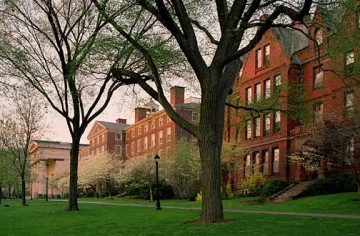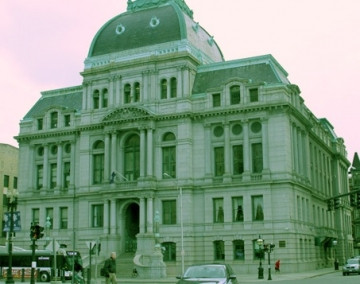Aaron Regunberg: Time for Brown to Pay its Fair Share in Providence
Saturday, November 12, 2011
A couple of weeks ago, Brown University held a conference on the role of universities and hospitals in urban development. The symposium brought together representatives from a number of different institutions of higher learning to speak about the various ways in which their schools were engaging with and adding value to the urban communities of which they are a part.
Brown’s president, Ruth Simmons, started the conference off with a speechabout what Brown is doing for Providence. She didn’t, actually, have all that much to say, focusing almost entirely on Brown’s current work in the ‘knowledge district’ and the ways in which Brown is attempting to develop this area as a center of health- and information-based research.
After President Simmons was finished, a representative from Syracuse University stepped up to the podium. To my great, impressed surprise, she proceeded to describe the incredibly far-reaching array of community-based programs that SU has implemented in the seven years since its current chancellor, Nancy Cantor, arrived in Syracuse with a vision that the university should be a public good instead of an ivory tower. I don’t think I can adequately describe the range and breadth of every partnership SU has built with the city of Syracuse, but as a starter, they offer scholarships at two dozen private colleges to every graduate of Syracuse public high schools; they have invested some $12 million in residential restoration and created opportunities for SU’s architecture school and environmental engineers to help design hundreds of affordable, green homes and rental properties in local neighbhorhoods; they have worked to overhaul unused land and vacant warehouses, transforming these sites of blight into productive business and art spaces; they have encouraged SU research staff to focus their scholarly attention on helping to solve problems in the local community; and they have radically increased the school’s diversity by recruiting more local students, economically disadvantaged students, and students of color.
GET THE LATEST BREAKING NEWS HERE -- SIGN UP FOR GOLOCAL FREE DAILY EBLASTCommunity Engagement is Key
Aside from the substance of these initiatives, another striking aspect of the Syracuse University presentation was its emphasis on partnerships. Again and again, the woman from SU reiterated her university’s commitment to working with—versus in or for—the city of Syracuse. The words that kept coming up were not community service, but community engagement (a phrase that President Simmons failed to use once during her description of Brown’s top-down work in Providence).
And Syracuse wasn’t alone; as the conference continued with representatives from other institutions, it became clear that there are a number of universities with a real commitment to being good neighbors and positive forces in their communities. Listening to these presentations, I couldn’t help but feel ashamed of my own school(I am currently an undergrad at Brown).I remember wondering, in particular, what Ruth Simmons must have been thinking. Did her own“we’re doing our part by expanding our research facilities” speech seem as pathetic to her as I’m sure it suddenly did to everyone else in the room? Was she troubled by the fact that SU has been willing to invest so much more into its community than Brown has, despite the fact that SU has an endowment just a fraction the size of Brown’s?
Probably not. The Brown Corporation has repeatedly made clear that it’s not in the business of giving to the community—it’s in the business of maintaining itself as an elite, international research institution, and that’s that. Why should they give back to the city in significant ways, the Corporation asks; Brown, as a private university, doesn’t owe Providence anything.
City Does a lot for Brown
The problem with that logic, of course, is that Brown, as the single largest property-holder in the city, actually owes Providence a whole lot. As most taxpayers in our city know, despite owning approximately $1 billion worth of property in Providence, Brown (as a tax-exempt non-profit) does not have to pay any property taxes, meaning that Providence loses around $33.8 million worth of revenue every year. The grating part, of course, is that Brown still utilizes city services. As a Brown student, I require police protection provided by the city, I bike on roads paved by the city, my life is made easier by university employees who were educated by the city, and when there’s a blizzard I wait until the streets are cleared by snowplows from the city. Brown University receives all of these services, it just currently don’t have to pay for them.
Brown does give Providence some money in the Payment In Lieu of Taxes (PILOT) program…to the sweet, sweet sum of a little over $1 million annually. That, incidentally, is many, many times smaller than the PILOT programs that Brown’s peer schools like Harvard and Yale contribute to their cities, and less than a thirtieth of what it would owe if, instead of being an incredibly powerful and resource-rich institution, Brown was like every other struggling family in this city that has to pay taxes on their property.
Of course, I understand that Brown is a large employer of Providence residents, and we should certainly appreciate the value of these jobs. But we can’t lionize Brown for needing custodians and cafeteria workers (particularly because the administration has actively tried to cut these hardworking employee’s benefits at every new contract negotiation I’ve witnessed during my enrollment).
Most taxpayers in Providence care a lot about this issue, but until that caring is translated into real, organized pressure on the university to pay their fair share, I don’t see things getting any better. Brown has a pretty sweet deal right now, and—unlike Syracuse University’s Nancy Cantor—Ruth Simmons has made it clear that she’s not going to give that up that sweet deal just because it’s the right thing to do. Of course, it’s unfair to put too much responsibility on the Providence community to push for change; much of the pressure on Brown needs to come from alumni and students like me.But I think there’s a definite role for Providence to come together and put its own collective weight into the fight. Neighborhood organizations, PTOs, community groups, everyone who has a stake in Brown paying its fair share needs to make their voices heard. Right now, the Brown Corporation believes it doesn’t have to worry about community approval; it’s our job, I believe, to prove them wrong.
If you valued this article, please LIKE GoLocalProv.com on Facebook by clicking HERE.
Related Articles
- Aaron Regunberg: History and Education Reform
- Aaron Regunberg: RI Students Left Out of Education Reform Debate
- Aaron Regunberg: Stop Calling Them “Illegals”
- Aaron Regunberg: The Case Against Achievement First
- Aaron Regunberg: The Downside To Teach For America
- Aaron Regunberg: Who’s Being Selfish?
- Aaron Regunberg: Why You Should Occupy Providence
- Aaron Regunberg: Even Bush Called It Voodoo





